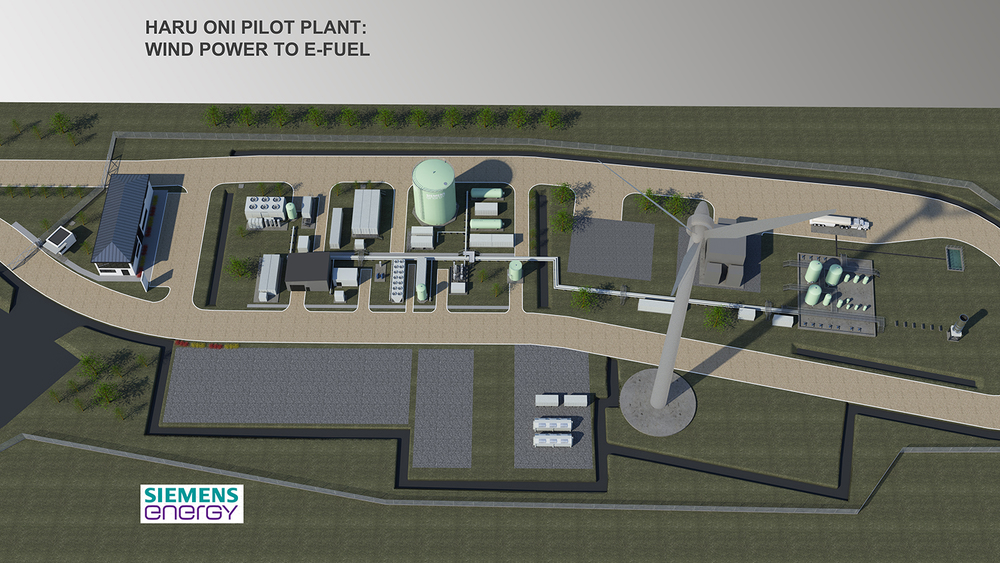Current Press releases
Siemens Energy and Porsche , with partners, advance climate-neutral e-fuel development Press release from Siemens Energy and Porsche
.
- World’s first integrated commercial plant for producing climate-neutral fuel being built in Chile
- Innovations from Germany to industrialize synthetic fuels and decarbonize the mobility sector
- German Economy Ministry supports beacon project as part of national hydrogen strategy
Porsche is planning to use e-fuels – initially on race courses and in vehicle trials, prospectively also in production sports cars
Munich/Stuttgart. Siemens Energy, joined by sports car maker
The “Haru Oni” pilot project in Magallanes Province takes advantage of the excellent wind conditions in southern Chile to produce climate-neutral fuel with the aid of green wind power. As part of Germany’s national hydrogen strategy, to support the project Siemens Energy will get a grant of some 8 million euros from the Federal Ministry for Economic Affairs and Energy, the ministry announced today.
Christian Bruch, CEO Siemens Energy: “Establishing a sustainable energy economy is going to require some rethinking. Renewable energy will no longer be produced only where it’s needed, but where natural resources like wind and sun are available on a massive scale. So new supply chains are going to arise all over the world to carry renewable energy from one region to another. That’s especially important for Germany, which – bottom-line – has to import energy if it’s going to meet its nationwide demand. Hydrogen will come to play an increasingly important role in storing and transporting energy. Which is why the German government’s support for the project is an important signal.”
Federal Economy Minister Peter Altmaier: “Hydrogen is a key component for successfully carrying out the energy transformation in every sector. That’s why, with the National Hydrogen Strategy, we aim to take advantage of the opportunities that hydrogen offers for the climate, energy and economic policy. We know we won’t be able to cover our national demand out of domestic production alone, and will need international partnerships. So I’m very pleased to see that Siemens Energy and
Siemens Energy is a co-developer of the “Haru Oni” project (also known as HIF project), and is serving as a systems integrator to cover the entire value chain – from power generation using Siemens Gamesa wind turbines, to producing green hydrogen, to conversion into synthetic fuel. The company’s flexible PEM (PEM = Proton Exchange Membrane) electrolysis is ideally suited for using volatile wind power.
As the fuel’s primary user,
AME is the primary developer and owner of the HIF (Highly Innovative Fuels) project company. Enel is a co-funder of the plant, with a focus on wind power and electrolysis. ENAP will support the project by providing operating staff and with maintenance and logistics.
Chile, with its excellent climate conditions for wind power and the associated low cost of electricity, has a very high potential in international terms for producing, exporting and locally using green hydrogen. To generate green hydrogen, electrolyzers use wind power to dissociate water into its two components, oxygen and hydrogen. In a second step, plans call for filtering CO2 out of the air and then combining it with the green hydrogen to form synthetic methanol. The result is renewable methanol, which can be converted into climate-friendly fuel using an MTG (Methanol To Gasoline) technology to be licensed and supported by ExxonMobil.
More information about “Haru Oni” project at: www.siemens-energy.com/haru-oni
Further information, film and photo material in the
Contact partner for press:
Peter Gräve
Phone: +49 1523 911 3486
Email: peter.graeve@porsche.de
Siemens Energy AG
Alfons Benzinger
Phone: +49 174 155 9447
Email: alfons.benzinger@siemens-energy.com
Siemens Energy is one of the world’s leading energy technology companies. The company works with its customers and partners on energy systems for the future, thus supporting the transition to a more sustainable world. With its portfolio of products, solutions and services, Siemens Energy covers almost the entire energy value chain – from power generation and transmission to storage. The portfolio includes conventional and renewable energy technology, such as gas and steam turbines, hybrid power plants operated with hydrogen, and power generators and transformers. More than 50 percent of the portfolio has already been decarbonized. A majority stake in the listed company Siemens Gamesa Renewable Energy (SGRE) makes Siemens Energy a global market leader for renewable energies. An estimated one-sixth of the electricity generated worldwide is based on technologies from Siemens Energy. Siemens Energy employs more than 90,000 people worldwide in more than 90 countries and generated revenue of around €27.5 billion in fiscal year 2020. www.siemens-energy.com.
Dr. Ing. h.c. F.
Model Range 718
Model Range 911 (992): Fuel consumption combined 11.3 – 9.4 l/100 km; CO2 emissions 257 – 215 g/km
Model Range
Model Range
Model Range
Model Range
12/2/2020
Further information and pictures for journalists and media representatives can be found on the


![[+]](https://files.porsche.com/filestore/news/international-de/none/619733/headthumbnail1/5f7af1bf-349e-11eb-80d0-005056bbdc38/Siemens-Energy-and-Porsche%2c-with-partners%2c-advance-climate-neutral-e-fuel-development.jpg)
![[+]](https://files.porsche.com/filestore/news/international-de/none/619733/headthumbnail2/57d578f3-349e-11eb-80d0-005056bbdc38/Siemens-Energy-and-Porsche%2c-with-partners%2c-advance-climate-neutral-e-fuel-development.jpg)